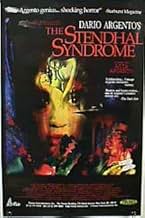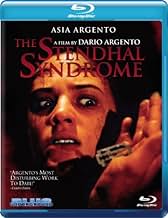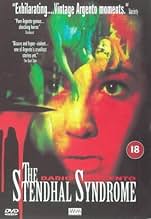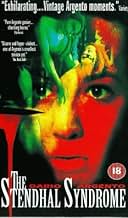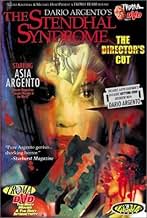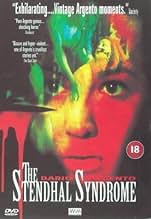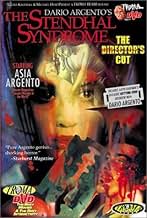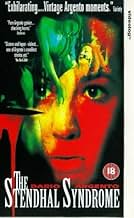IMDb रेटिंग
6.0/10
9.6 हज़ार
आपकी रेटिंग
अपनी भाषा में प्लॉट जोड़ेंA young policewoman slowly goes insane while tracking down an elusive serial rapist/killer through Italy when she herself becomes a victim of the brutal man's obsession.A young policewoman slowly goes insane while tracking down an elusive serial rapist/killer through Italy when she herself becomes a victim of the brutal man's obsession.A young policewoman slowly goes insane while tracking down an elusive serial rapist/killer through Italy when she herself becomes a victim of the brutal man's obsession.
- पुरस्कार
- 1 जीत और कुल 6 नामांकन
फ़ीचर्ड समीक्षाएं
Dario Argento is one of my all-time favorite directors, and probably THE living director I admire the most. The 1990s were a weak decade for Horror in general, and also Argento's weakest. Argento is a cinematic genius, however, and while 90s achievements get nowhere near the brilliance of his masterpieces from the 70s and 80s, films like "Trauma" (1993) or this "Stendhal Syndrome" are nonetheless more than decent Thrillers that outshine the majority of 90s Horror outings.
"La Sindrome Di Stendhal" aka "The Stendhal Syndrome", which was made in-between "Trauma" and the disappointing "Il Fantasma Dell'Opera" (1998), is certainly one of his lesser films, but definitely a more than decent, very suspenseful, atmospheric and often quite weird psychological Horror effort that his fans cannot afford to miss. I like it about equally as I do "Trauma", with a slight preference for "The Stendhal Syndrome" due to the brilliant score by Ennio Morricone. What I found a bit strange is that the film is often labeled as a Giallo, when it is not really. There are no stylishly bloody murders from the killer's perspective, and really what makes the term "Giallo" quite out of place is the fact that the killer's identity is not really a mystery. The suspense is there, however, and most true Horror fans will agree that Argento is the absolute master of suspense. While the film is not quite as exceptionally gory as many other Argento flicks, it is definitely violent, especially the several rape-scenes (one of them taking place quite in the beginning) are more than a bit brutal.
Argento reportedly first wanted to get Bridget Fonda and Jenifer Jason Leigh for the leading role in the film, but his beautiful daughter Asia Argento is, as far as I am considered, the perfect cast for the role. She may look a little too young for an experienced female homicide detective, but she fits the character of her role perfectly, and, as far as I am considered, that is most important. Asia plays detective Anna Manni, a Rome investigator specialized on sex crimes, who is trying to track down a serial rapist and murderer... I do not want to give any more of the plot away. The rest of the performances are also quite good, especially the German actor Thomas Kretschmann delivers a good performance, but Asia Argento sure is the highlight. The film is quite different to Argento's other films, but certainly not bad. None other than the great Ennio Morricone delivers a brilliant and immensely eerie score that intensifies the creepy atmosphere, and, as it is always the case with Argento's films, the film is visually stunning and highly suspenseful.
Dario Argento's masterpieces are his films from the 70s and 80s, and he returned to old greatness in 2001, with the ultra-violent and greatly old-fashioned Neo-Giallo "Non Ho Sonno" (aka. "Sleepless"), which was made in brilliant Argento-tradition. His 90s outings are certainly a bit inferior to the rest of his brilliant repertoire, but they are nonetheless way above average. While it is one of lesser films, "The Stendhal Sydrome" is nevertheless a suspenseful, atmospheric and highly recommendable film with some downright ingenious elements that Horror lovers should definitely not miss. Highly recommended!
"La Sindrome Di Stendhal" aka "The Stendhal Syndrome", which was made in-between "Trauma" and the disappointing "Il Fantasma Dell'Opera" (1998), is certainly one of his lesser films, but definitely a more than decent, very suspenseful, atmospheric and often quite weird psychological Horror effort that his fans cannot afford to miss. I like it about equally as I do "Trauma", with a slight preference for "The Stendhal Syndrome" due to the brilliant score by Ennio Morricone. What I found a bit strange is that the film is often labeled as a Giallo, when it is not really. There are no stylishly bloody murders from the killer's perspective, and really what makes the term "Giallo" quite out of place is the fact that the killer's identity is not really a mystery. The suspense is there, however, and most true Horror fans will agree that Argento is the absolute master of suspense. While the film is not quite as exceptionally gory as many other Argento flicks, it is definitely violent, especially the several rape-scenes (one of them taking place quite in the beginning) are more than a bit brutal.
Argento reportedly first wanted to get Bridget Fonda and Jenifer Jason Leigh for the leading role in the film, but his beautiful daughter Asia Argento is, as far as I am considered, the perfect cast for the role. She may look a little too young for an experienced female homicide detective, but she fits the character of her role perfectly, and, as far as I am considered, that is most important. Asia plays detective Anna Manni, a Rome investigator specialized on sex crimes, who is trying to track down a serial rapist and murderer... I do not want to give any more of the plot away. The rest of the performances are also quite good, especially the German actor Thomas Kretschmann delivers a good performance, but Asia Argento sure is the highlight. The film is quite different to Argento's other films, but certainly not bad. None other than the great Ennio Morricone delivers a brilliant and immensely eerie score that intensifies the creepy atmosphere, and, as it is always the case with Argento's films, the film is visually stunning and highly suspenseful.
Dario Argento's masterpieces are his films from the 70s and 80s, and he returned to old greatness in 2001, with the ultra-violent and greatly old-fashioned Neo-Giallo "Non Ho Sonno" (aka. "Sleepless"), which was made in brilliant Argento-tradition. His 90s outings are certainly a bit inferior to the rest of his brilliant repertoire, but they are nonetheless way above average. While it is one of lesser films, "The Stendhal Sydrome" is nevertheless a suspenseful, atmospheric and highly recommendable film with some downright ingenious elements that Horror lovers should definitely not miss. Highly recommended!
Regarded as one of Argento's lesser works, I find this one much more plausible than any of his early films. Let's face it, Argento doesn't care much about plot or even acting. His films are probably the frustrating I've ever seen: There are things I love, and things I hate about them. I grew up watching much of his films mutilated by Italian Television. I was a kid back then, and strangely enough his films never scared me when they were supposed to. They were really over the top. But I loved the colours, the pictures and once in a while I found myself humming Claudio Simonetti's electronic scores.
Now with this film Argento has Morricone, who is definitely a master and he does a great job here. Anna's character is really intriguing. Some people dismiss Asia's acting style, but I think it goes very well with her father's aesthetics. You wont find the crazy colours here. Everything is more restrained. The opening for example scene is great. But the film looses interest towards the end. Still I think is one of Argento's most solid pieces. The idea is truly interesting and Anna's relationship with the killer is fascinating. The hallucinations scenes of Anna going into the paintings are masterfully done.
After the huge disappointment of Il Cartaio, I hope he truly returns to form, and start doing what he's good at: Going crazy with film. La Sindrome Di Stendhal is a pretty good step.
Now with this film Argento has Morricone, who is definitely a master and he does a great job here. Anna's character is really intriguing. Some people dismiss Asia's acting style, but I think it goes very well with her father's aesthetics. You wont find the crazy colours here. Everything is more restrained. The opening for example scene is great. But the film looses interest towards the end. Still I think is one of Argento's most solid pieces. The idea is truly interesting and Anna's relationship with the killer is fascinating. The hallucinations scenes of Anna going into the paintings are masterfully done.
After the huge disappointment of Il Cartaio, I hope he truly returns to form, and start doing what he's good at: Going crazy with film. La Sindrome Di Stendhal is a pretty good step.
What makes up the singular pleasure that is Dario Argento? Maybe it's the crossroads where High Romanticism and hardcore porn meet. (I'm referring to the feeling of his work--not the images.) Argento seems doomed, like Peckinpah and like Lynch, to have summed up his world-view in a single masterpiece, the 1977 SUSPIRIA; the thrillers that came before and the low-budget shockers that came after may offer delights, but nothing close to that unity of vision.
Seeing THE STENDHAL SYNDROME projected in Los Angeles, I was struck with newfound sympathy for the Star Wars fans protesting way too much in favor of THE PHANTOM MENACE. If you love THE STENDHAL SYNDROME, you love Argento, and that is that--you may see the flaws, but they don't ruin your pleasure. The picture has too many Achilles heels to enumerate here, but what's important is that nobody in world cinema today is wrestling with his soul in the psychosexual mire the way Argento does. He puts his misogynistic demons and his almost sentimental compassion right out there; and only Cronenberg has such a direct pipeline to his own unconscious. Not to mention the fabulous, cascading images--Argento's stock-in-trade is Victorian Liebestod, Edward Gorey gone porno, and THE STENDHAL SYNDROME has sequences that rank with his best.
The sketchy thing about STENDHAL SYNDROME, like the maestro's TRAUMA, is his use of his daughter, Asia Argento, in scenes one cannot imagine a father watching, much less filming. Whatever memoirs come down the pike twenty years later, it must be said: Argento for certain lets it all hang out, and the land-mined terrain he maps is, to my taste, thrilling.
Seeing THE STENDHAL SYNDROME projected in Los Angeles, I was struck with newfound sympathy for the Star Wars fans protesting way too much in favor of THE PHANTOM MENACE. If you love THE STENDHAL SYNDROME, you love Argento, and that is that--you may see the flaws, but they don't ruin your pleasure. The picture has too many Achilles heels to enumerate here, but what's important is that nobody in world cinema today is wrestling with his soul in the psychosexual mire the way Argento does. He puts his misogynistic demons and his almost sentimental compassion right out there; and only Cronenberg has such a direct pipeline to his own unconscious. Not to mention the fabulous, cascading images--Argento's stock-in-trade is Victorian Liebestod, Edward Gorey gone porno, and THE STENDHAL SYNDROME has sequences that rank with his best.
The sketchy thing about STENDHAL SYNDROME, like the maestro's TRAUMA, is his use of his daughter, Asia Argento, in scenes one cannot imagine a father watching, much less filming. Whatever memoirs come down the pike twenty years later, it must be said: Argento for certain lets it all hang out, and the land-mined terrain he maps is, to my taste, thrilling.
Argento has been cursed with a number of duds in recent years. 'Two Evil Eyes', 'The Phantom of the Opera', 'Sleepless', 'The Card Player' and one of the worst MASTERS OF HORROR episodes yet 'Jenifer'. However, the beautiful, poignant 'The Stendhal Syndrome' is an extremely well crafted rose between a number of poisonous thorns. It sees a return to the atmospheric dream-like charm of his earlier films like 'Phenomena' and 'Suspiria', but adopting his more recent sadism (it's always there, just a different style in his newer films) that gave slight high points in his otherwise dull modern films. After two poorly reviewed films ('Trauma' and 'Two Evil Eyes') Argento has finally done it right.
The film stars his daughter, Asia (whose interesting relationship with Dario adds to the intriguing and off-beat persona he puts out), as Anna, a beautiful police detective in Rome. When she is targeted by the serial killer she is hunting, she is raped and beaten and so leads Argento's best character study and one of the most intense of his films to date. Rather than following the madman as he offs prostitutes and impressionable young women through Italy (the film lightly touches on it, but the more left to the imagination the better), the film follows Anna as she loses grip on reality and develops a strange disease in which she can ever paintings in her mind and they help solve the case, called the Stendhal Syndrome. As the film goes on the attacks on Anna become more and more vicious, and the final climatic ending is one of Argento's best.
Asia delivers a interesting performance, to say it is good is to stretch the truth, but it is suited to the role and you can tell she has a lot of acting talent. All the other performances are rather flat, but as with all of Agento's films the performances aren't what really matter. The cinematography is bland, but as with Asia's performance suits the film better than if it were Technicolor. The tension and music is amazing, the film devotes itself to really unsettling you, rather than just entertaining you like other recent Argento's. 'The Stendhal Syndrome' is probably the most violent and disturbing I've seen the man go, the rape and murder scenes are gratuitously sadistic and the scenes where Anna is raped are bordering on exploitation.
Overall 'The Stendhal Syndrome' is a fantastic return to form fr Argento, and I hope 'The Third Mother' is anywhere near as well-crafted as this.
7/10
The film stars his daughter, Asia (whose interesting relationship with Dario adds to the intriguing and off-beat persona he puts out), as Anna, a beautiful police detective in Rome. When she is targeted by the serial killer she is hunting, she is raped and beaten and so leads Argento's best character study and one of the most intense of his films to date. Rather than following the madman as he offs prostitutes and impressionable young women through Italy (the film lightly touches on it, but the more left to the imagination the better), the film follows Anna as she loses grip on reality and develops a strange disease in which she can ever paintings in her mind and they help solve the case, called the Stendhal Syndrome. As the film goes on the attacks on Anna become more and more vicious, and the final climatic ending is one of Argento's best.
Asia delivers a interesting performance, to say it is good is to stretch the truth, but it is suited to the role and you can tell she has a lot of acting talent. All the other performances are rather flat, but as with all of Agento's films the performances aren't what really matter. The cinematography is bland, but as with Asia's performance suits the film better than if it were Technicolor. The tension and music is amazing, the film devotes itself to really unsettling you, rather than just entertaining you like other recent Argento's. 'The Stendhal Syndrome' is probably the most violent and disturbing I've seen the man go, the rape and murder scenes are gratuitously sadistic and the scenes where Anna is raped are bordering on exploitation.
Overall 'The Stendhal Syndrome' is a fantastic return to form fr Argento, and I hope 'The Third Mother' is anywhere near as well-crafted as this.
7/10
Argento had seen his better days as a movie director and surely it's not easy to top such masterpieces such as Suspiria and The Inferno.
Asia Argento as detective Anna Manni isn't the best casting choice but as an actress she certainly did her best. It's difficult to believe that she really is a police detective at such a young age. It's obvious that a more mature actress should have been cast. Nevertheless that obscurity could have been used to make the film better. Would it be a better film if Anna Manni was just a woman living in her delusions.
The film certainly had it's moments but on the other hand it has some annoying flaws such as very bad cgi effects. Why use experimental effects if they look dumb. They should have gone back in time to the 70's or 80's how they made the effects without computers.
Ennio Morricone's score is amazing though and certainly does a big favor for the film's atmosphere. To sum it up this film is watchable even for Argento fans but it isn't anything like his films used to be. It's really evident that Italian film industry had been in a recession since the late 80's.
Asia Argento as detective Anna Manni isn't the best casting choice but as an actress she certainly did her best. It's difficult to believe that she really is a police detective at such a young age. It's obvious that a more mature actress should have been cast. Nevertheless that obscurity could have been used to make the film better. Would it be a better film if Anna Manni was just a woman living in her delusions.
The film certainly had it's moments but on the other hand it has some annoying flaws such as very bad cgi effects. Why use experimental effects if they look dumb. They should have gone back in time to the 70's or 80's how they made the effects without computers.
Ennio Morricone's score is amazing though and certainly does a big favor for the film's atmosphere. To sum it up this film is watchable even for Argento fans but it isn't anything like his films used to be. It's really evident that Italian film industry had been in a recession since the late 80's.
क्या आपको पता है
- ट्रिवियाThe opening scene was shot inside the famous Uffizi Gallery in Florence. As of 2014, Dario Argento is the only director who's ever received permission to film inside the museum.
- गूफ़Though featuring prominently during the film's opening sequence set at the Uffizi in Florecne, Peter Bruegel's 'Landscape with the Fall of Icarus' is actually housed at the Royal Museum of Fine Arts of Belgium in Brussels.
- भाव
Insp. Manetti: You're young. I can trust you.
- इसके अलावा अन्य वर्जनUS DVD release by Troma release is the complete version of the English language edition, but, like all English releases, is still missing around 2 minutes of material exclusive to the Italian print.
- कनेक्शनFeatured in Il mondo di Dario Argento 3: Il museo degli orrori di Dario Argento (1997)
टॉप पसंद
रेटिंग देने के लिए साइन-इन करें और वैयक्तिकृत सुझावों के लिए वॉचलिस्ट करें
विवरण
बॉक्स ऑफ़िस
- बजट
- $38,00,000(अनुमानित)
- चलने की अवधि2 घंटे
- रंग
- ध्वनि मिश्रण
- पक्ष अनुपात
- 1.85 : 1
इस पेज में योगदान दें
किसी बदलाव का सुझाव दें या अनुपलब्ध कॉन्टेंट जोड़ें



